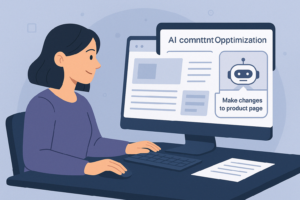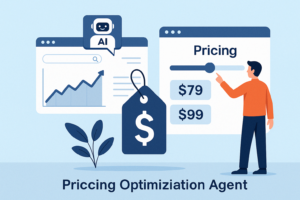Ecommerce Personalization Blog
Ecommerce tips, strategies, and news – all without ever having
The Future of eCommerce: How AI Agents Will Transform the Day-to-Day of eCommerce Managers
The evolution of artificial intelligence (AI) in eCommerce is set to reshape how online retailers approach conversion optimization and growth. Emerging AI technologies will soon enable eCommerce managers to streamline complex analytical processes and significantly enhance their strategic decision-making capabilities.
The Conversion Optimization Agent
Imagine an AI-powered conversion optimization agent that continuously analyzes data from diverse analytics platforms, such as Google Analytics and user recording tools like Hotjar. This agent autonomously identifies conversion issues, such as cart abandonment patterns, user interface friction points, or technical glitches. Once identified, these issues are automatically routed to the appropriate teams along with detailed, actionable insights and suggested solutions. For instance, technical problems are directed to the technical team with clearly defined recommendations, simplifying the resolution process.
Instead of manually combing through extensive data, eCommerce managers and their teams will receive concise, prioritized alerts that help them swiftly address issues and enhance the overall user experience.
Autonomous Content Optimization Agent
AI agents will also transform how eCommerce content is optimized. Managers will no longer need to navigate cumbersome CMS platforms; instead, they’ll interact with a user-friendly interface. Through simple interactions, managers can request content changes, experiments, and optimizations without coding knowledge.
AI will autonomously implement these content adjustments, generating the necessary code changes automatically. Managers simply review and approve the adjustments.
Centralized AI Interface: Unified Insights and Interaction
In the future, eCommerce managers will benefit significantly from a centralized, chat-like interface powered by AI, streamlining how they interact with multiple systems. This interface will consolidate data from analytics platforms, inventory management systems, merchandising tools, and other essential sources into a single intuitive platform.
Rather than logging into multiple tools, managers will effortlessly communicate their queries and requests through conversational interactions. AI agents will provide timely and relevant insights, alerting managers about critical issues, highlighting opportunities, and recommending immediate actions. By simplifying and centralizing interactions, managers will be able to quickly make informed decisions, enhancing productivity and responsiveness.
Intelligent Merchandising Agent
AI will also revolutionize merchandising through specialized agents designed to optimize product display and inventory management. These intelligent agents analyze sales data, customer browsing behaviors, inventory statuses, seasonal trends, and market conditions. They then dynamically arrange products on digital shelves to maximize relevance, visibility, and sales potential.
By automating merchandising decisions, these agents ensure optimal inventory turnover and personalized customer experiences, ultimately driving higher conversion rates and customer satisfaction.
Autonomous Pricing Optimization
Additionally, specialized AI agents dedicated to pricing optimization will play a crucial role. These agents will dynamically adjust pricing strategies based on factors like current inventory levels, demand trends, competitor pricing strategies, and customer buying behavior.
By processing and responding to real-time market conditions, these agents will optimize margins and competitiveness simultaneously, enabling retailers to stay agile and responsive.
Human-AI Collaboration: Enhancing Efficiency and Strategy
The future of eCommerce doesn’t involve replacing human oversight but enhancing it. AI agents will handle data-intensive tasks, freeing human managers and their teams to concentrate on high-value strategic initiatives, brand development, and building stronger customer relationships.
Companies that adopt these collaborative AI strategies early will significantly benefit from increased operational efficiency, deeper customer insights, and improved conversion rates.
At Barilliance, our focus remains on developing innovative AI-driven solutions that address the evolving challenges and opportunities faced by eCommerce businesses. By continuously exploring and investing in intelligent technology, we help online retailers stay ahead in an increasingly complex and competitive market.
Embracing AI today means preparing for a more efficient, insight-driven, and customer-centric tomorrow.



